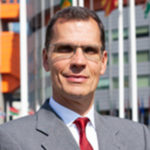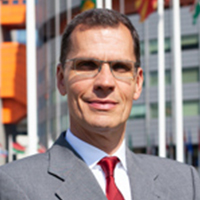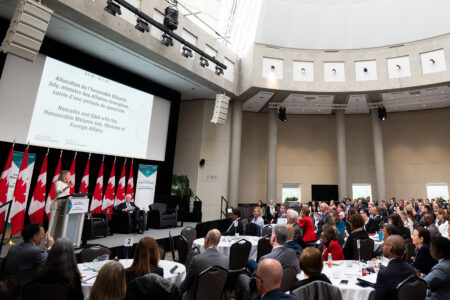
Back in 1993, Canada made a decision that was little noticed domestically but was felt around the world. In a cost-cutting measure, Canada severed ties with the United Nations Industrial Development Organization (UNIDO). The savings were inconsequential to the balance sheet of the country, and practically ignored politically. At the time, “industrial development” conjured images of cement factories and heavy equipment plants belching smoke and waste into pristine rivers and lakes. But that was then. The UNIDO of today has a different mission in mind: to promote industrial development for poverty reduction, inclusive globalization and environmental sustainability.
UNIDO’s work is essential to achieving the UN’s 2030 Agenda for Sustainable Development, which aims to end all forms of poverty, fight inequality and tackle climate change. At its most basic level, it means providing hope that there is a viable future. That hope requires jobs, growth and prosperity, coupled with clean air and water that help mitigate the worst of climate change. Industrial development done properly is the one single vehicle that can provide them all.
These goals are directly compatible with Canada’s current international assistance policy, so why is Canada not part of this effort? This is where the world needs more Canada — it has been one of the true champions of multilateralism for over 70 years. Canada must not just say the words to defend multilateralism, it must take actions to support it. Rejoining UNIDO would send that message.
Multilateralism as expressed through programs such as UNIDO is facing its own redefinition. Indeed, most of the issues faced by development over the past decades have become “trans-border” in nature: desperate migrants break down fences, while greenhouse gases float freely with the winds. Whereas the idealists of yesterday dreamed of coordinated action to create a more peaceful and prosperous world, today’s domestically centred politics is calling a retreat toward a more individualized, national approach.
So why now, when we face the challenges requiring the most solidarity, are we taking our foot off the gas with multilateralism? Governments of all stripes usually act out of self-interest; that’s as it should be. But what defines that self-interest has become critical. It should be the task of all who believe in multilateralism, like Canada, to argue that a unified approach to global problems such as climate change and mass migration is in each nation’s self-interest. Failure to make that point carries a price.
Greening industry to mitigate climate change
The effects of climate change know no boundaries, and real financial impacts arise from increasingly severe weather and its effects on public infrastructure. For example, the Insurance Bureau of Canada estimates claims from natural disasters (floods, forest fires and more), which are correlated to increasing climate change, now top $1 billion annually, an increase from $400 million only decades ago. The impacts of these kinds of events are that much more devastating in impoverished countries — especially economies relying on agriculture — which are least equipped to endure and adapt to adversity.
Mitigating the damage of climate change is a foundational step towards a competitive and sustainable economy and a leap toward reducing poverty worldwide. Tackling the climate challenge requires industries and institutions — both public and private — to work together to find solutions that foster climate-resilient societies and green growth. Through policy advice, capacity building and the introduction of technologies, UNIDO promotes cleaner production, manufacturing and energy efficiency. The organization is committed to helping local businesses adopt sustainable industrial processes and technologies, and to delivering prosperity in an environment-friendly manner.
In fact, in 2017 alone, UNIDO’s efforts helped avoid over 155,000 tonnes of CO2 emissions, which is equivalent to the emissions from around 30,000 passenger cars driven for one year. While this reduction is impressive, more needs to be done. The scourge of climate change and poverty itself are only the beginning of the problem, because they create so many more.
Poverty and mass migration
While we’ve seen a broad decline in poverty worldwide, both extreme and moderate poverty still remain. Three-quarters of the world’s poor people live in rural areas with low productivity, inadequately diversified economies, high unemployment rates and job insecurity. Poverty has persisted where policies have failed to improve agro-industrial productivity and rural infrastructure and have not provided rural populations with access to social services. There could be more than 250 million unemployed young men and women in Africa by 2025 unless action, like the strategic policy and support that UNIDO provides, is taken.
If a national economy is neither strong nor stable, migration may be its people’s only hope for providing for themselves and their families. We are seeing the results daily, from the migrants crossing the Mediterranean to those making the long journey north from Central America.
And so it goes. Failed or underdeveloped economies propel a continuous cycle of poverty with real consequences for the rest of the world. Without inclusive and sustainable industrial development in home nations, this phenomenon is likely to continue.
A better outcome is that much more achievable with a coordinated approach. UNIDO represents one of the paths to a new sustainable future. In order to accelerate inclusive and sustainable industrial development and maximize impact, UNIDO advances innovation in development by harnessing the power of multi-stakeholder partnerships, including the private sector, financial institutions and other UN agencies. It also facilitates the mobilization of expertise, clean technology and financial resources to implement industrial development programs — tailored to each country’s needs — focusing on sectors with high potential for job creation.
Coming together for common good
A broad-based group of 168 countries make up UNIDO’s membership. However, the country seen as a global bulwark of multilateralism — Canada — is currently not one of them. At the time Canada left the organization, the forces of multilateralism seemed secure. But Canada’s withdrawal from UNIDO only emboldened the populist forces that saw the departure as part of a diminishing resistance to a rise in nationalism. So UNIDO adapted, reforming its mission and trimming its costs, and it focused on results, not process. It was not enough to re-engage Canadian interest. But that was then, this is now.
Without Canada’s support, the task of developing focused solutions and policies to reach global solutions is much harder. Canada has expertise in capacity building and a global reputation in AI and digital commerce — skills that are the bedrock for creation and growth of sustainable economies. With Canada’s support, UNIDO and the populations it works with would benefit from the influence this leader would have on strategic policy-making and programming. The member nations of UNIDO are looking to Ottawa for a sign that the original dream of shared responsibility for sustainable global prosperity is still alive. For Canada, the cost of membership is approximately $3 million. But the effect on projects to achieve inclusive globalization would be enormous.
Time is critical. Building industrial bases that respect the environment, promote the equality and well-being of women and youth, and serve as beacons of stability and hope to hundreds of millions of people is a task that cannot wait. The stakes are too high; the consequences of inaction, too severe. UNIDO needs and wants Canada back.
Photo: Shuttersck by Catalin Petolea
Do you have something to say about the article you just read? Be part of the Policy Options discussion, and send in your own submission. Here is a link on how to do it. | Souhaitez-vous réagir à cet article ? Joignez-vous aux débats d’Options politiques et soumettez-nous votre texte en suivant ces directives.








